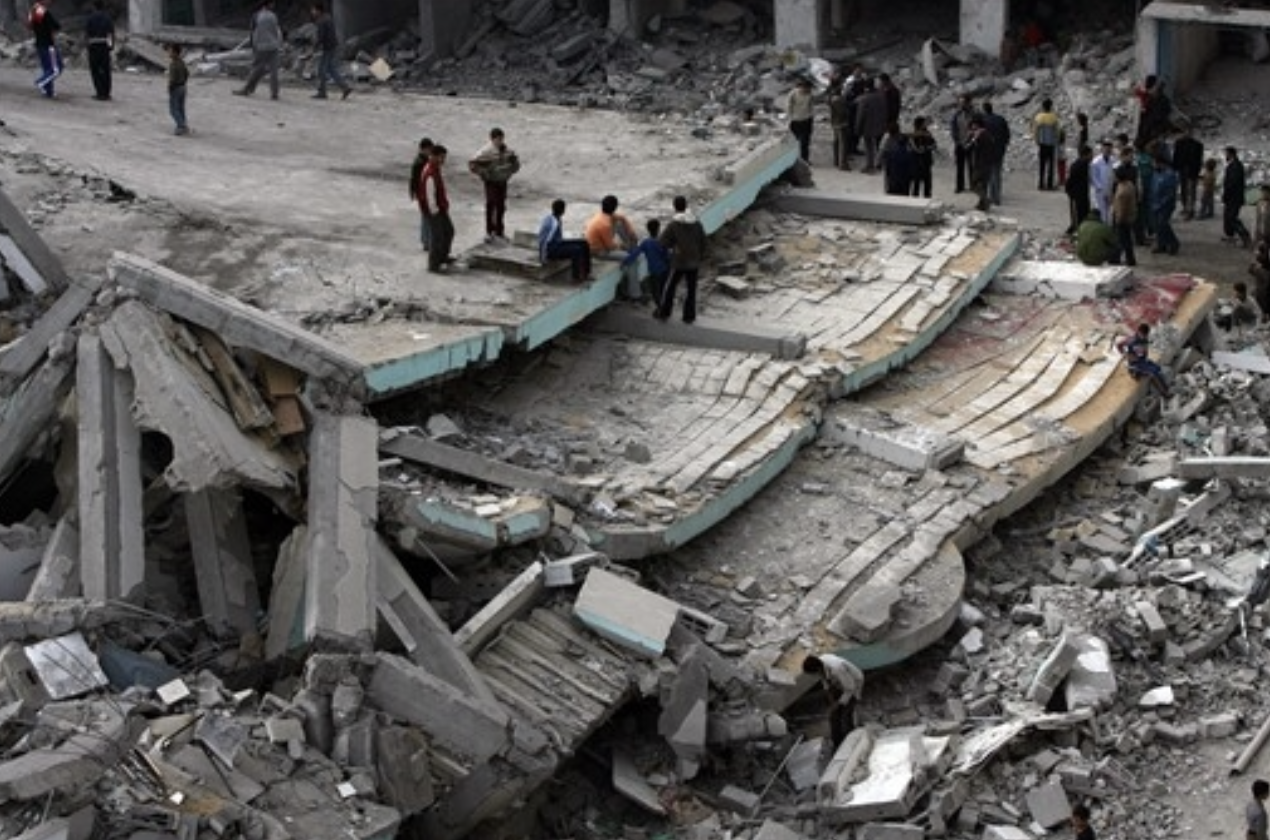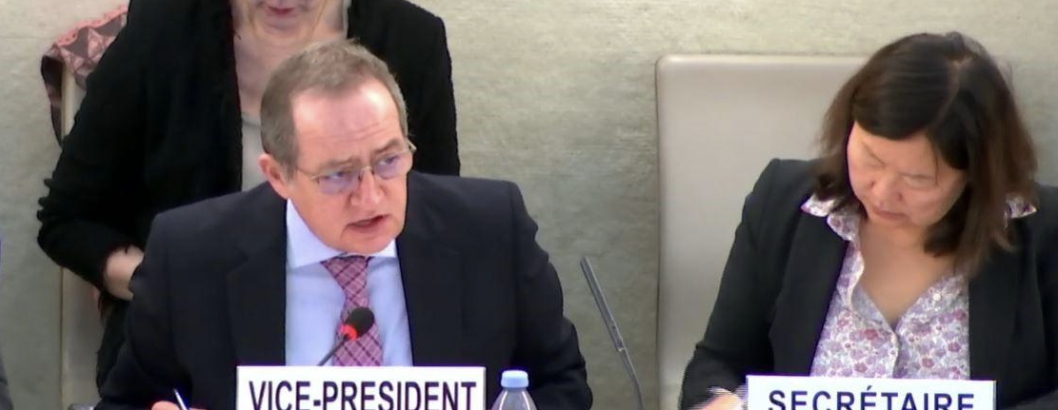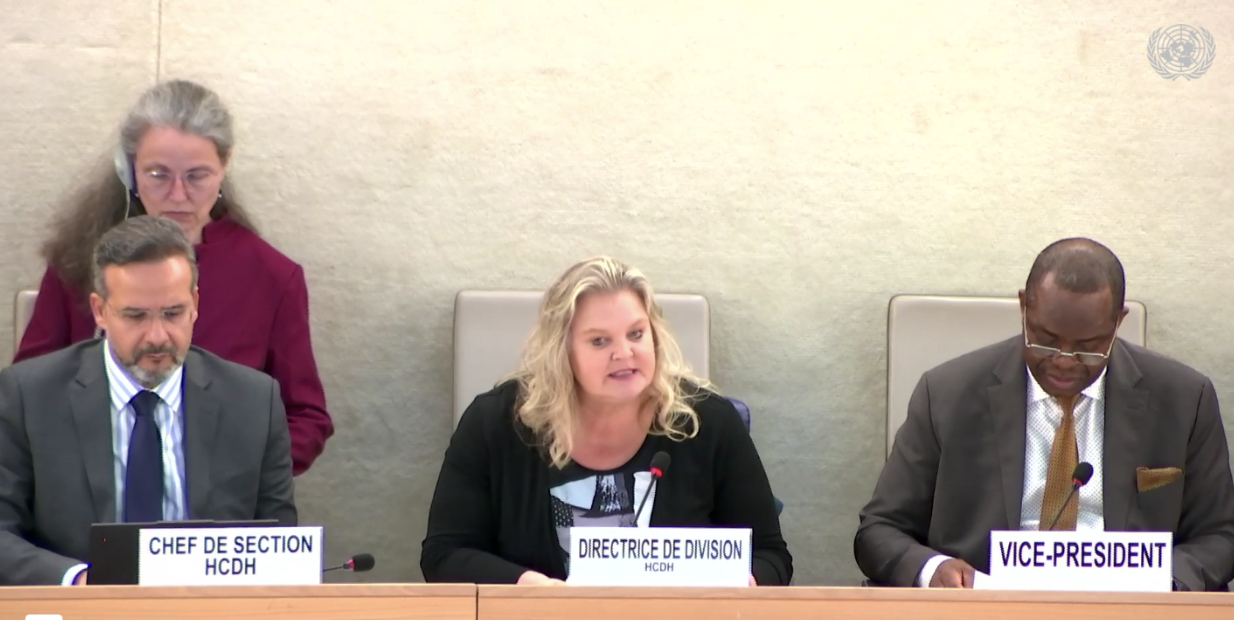Weaponizing the Law: Gaza and the Collapse of Humanitarian Protections
Image Source: (Flickr) https://flic.kr/p/5RG6u2
By Ahmed Wahbi / GICJ
Introduction
The world has watched in horror as the Israeli military turns Gaza into a graveyard. Entire families must pull the bodies of their loved ones from beneath collapsed buildings, buildings targeted and destroyed by Israeli airstrikes. Hospitals have vanished under Israeli bombs, deliberately reduced to rubble. Mass graves now hold the bodies of unarmed humanitarian workers, easily identifiable and offering no threat, executed and buried under Israeli occupation. These are not accidents. These are deliberate actions carried out by the Israeli military, fully aware of the consequences for civilians.
Despite the glaring brutality, powerful states continue to shield these acts behind the technical language of international humanitarian law (IHL). The problem does not lie in the law itself, but in its weaponisation by those who interpret it to serve power rather than justice. Francesca Albanese, the UN Special Rapporteur on Palestine, described this manipulation as the use of IHL as “humanitarian camouflage” to legitimise genocidal violence in Gaza [1]. Israel commits these crimes openly, knowing full well that its impunity remains protected by the silence, or complicity, of those who claim to uphold the law.
When Civilian Deaths Are “Lawful”
One of the most disturbing realities about IHL is that not all civilian deaths are considered unlawful. The principle of proportionality permits what is grimly referred to as “collateral damage”, provided the anticipated military advantage is not outweighed by the expected harm to civilians. This is a legal equation that completely disregards moral consequence. Albanese has warned that by portraying the entire Palestinian population as terrorists or complicit, Israel reduces all civilian presence to potential “collateral damage,” stripping the principle of proportionality of any protective value [2].
Israel has exploited this principle to justify repeated attacks on Gaza’s civilian infrastructure. It claims legal protection under proportionality while striking one of the world's most overcrowded and besieged urban areas. The human cost has been devastating.
In October 2023, Israeli airstrikes hit the Jabalya refugee camp, a densely populated residential area, killing more than 100 civilians, including around 69 children, and injuring 280 civilians. Israel claimed it targeted a Hamas commander and insisted the deaths were regrettable but lawful [3]. But this was no misjudgment. Israel knew the camp’s conditions. It knew that families lived in every building, that children filled the streets. It attacked regardless.
This was a massacre, carried out with full knowledge of the consequences. International law does not permit bombing civilian areas to target a single individual. Israel has twisted the principle of proportionality into a shield for impunity, using it not to limit harm but to justify it. The law does not allow the destruction of refugee camps or the routine killing of civilians. When these actions go unpunished, the law no longer protects the innocent, it protects the guilty.
The Disappearing Line Between Fighters and Civilians
International law draws a clear distinction: combatants may be lawfully targeted; civilians must be protected. This is not a grey area. It is foundational to the laws of war. But what happens when that distinction is deliberately erased, when civilians are killed and then labelled as combatants to justify the act?
This is exactly what occurred in Rafah on 23 March 2025. Israeli forces attacked a humanitarian convoy consisting of paramedics, civil defence workers, and United Nations personnel. The vehicles carried clear markings. The convoy had been coordinated through official military channels. There was no ambiguity about their identity, role, or conduct. They posed no threat. And still, they were attacked.
What followed was worse. The victims were later found in a mass grave, hands bound, some reportedly executed at close range. This was not the result of confusion or battlefield chaos. This was an intentional strike, followed by the concealment of evidence and the construction of a false narrative.
Israel initially defended the killings by citing military necessity and alleged threats. However, once video evidence emerged, showing the humanitarian convoy as marked, stationary, and posing no threat, the narrative changed. Only then did Israeli authorities describe the attack as a “tragic mistake” [4]. Absent that footage, the world would have been told, once again, that “military necessity” justified the deaths. The United Nations condemned the attack and called for an independent investigation. But condemnation alone does not deliver justice. The truth is clear: civilians were deliberately targeted, and Israel sought to hide behind a lie.
This attack in Rafah represents not just a violation of IHL, it is an assault on the very principle that civilians must be protected. When a state kills humanitarian workers, covers it up, and invokes false legal justifications, it must face consequences. There can be no room for ambiguity. What happened in Rafah was not lawful. It was not defensible. It was a crime, and silence in the face of that crime only guarantees its repetition.
When Hospitals Become Targets
Another recurring feature of this conflict is the targeting of so-called “dual-use” objects, civilian structures allegedly utilised for military purposes. Under IHL, a civilian facility may lose its protected status if it is used to gain a military advantage. However, this provision is increasingly being weaponised.
On 13 April 2025, the Al-Ahli Arab Hospital in Gaza was struck by Israeli airstrikes. Although the facility had reportedly been evacuated following a warning, the attack destroyed vital infrastructure and dealt a devastating blow to Gaza’s already overwhelmed healthcare system. Israeli authorities claimed the hospital was being used by Hamas to store weapons [5]. This explanation fits into a repeated pattern. A claim of military use appears, the strike follows, and legality is then declared. The hospital served civilians. It was one of the few remaining places where the injured could seek care. Reducing it to rubble under the cover of a statement does not make the act lawful. It reveals the intent to remove civilian lifelines through carefully chosen language.
Even where military use is established, IHL obliges all parties to uphold the principles of precaution, verification, and proportionality. In densely populated areas like Gaza, where civilian infrastructure is limited and the population has nowhere else to turn, civilians are often forced to coexist with combatants. Israel exploits this reality to justify repeated attacks on civilian areas and uses legal language to present deliberate strikes as lawful responses. Framing these attacks as lawful actions opens the door to further violations and strips civilians of the protection the law is meant to guarantee.
Legal Justifications and Political Shields
However, with the manipulation of legal language comes a deeper problem rooted in politics: a system of protection that allows repeated violations to continue without consequence. This political shielding blocks efforts to investigate the actions of Israel, with vetoes in the United Nations Security Council used routinely, most often by the United States [6]. The International Criminal Court (ICC), tasked with prosecuting war crimes, has faced political threats and sanctions simply for considering cases involving Israeli officials [7]. The issue is not the absence of legal standards. It is the deliberate choice to suppress them when they apply to Israel.
Conclusion
International humanitarian law exists to restrain war, not to permit its excesses. In Gaza, these restraints have collapsed under the weight of deliberate legal distortion. Israel has used the language of law to justify the unjustifiable: the killing of civilians, the bombing of hospitals, and the execution of aid workers. These are not misinterpretations, they are calculated manipulations. When law becomes a shield for the powerful rather than a safeguard for the defenceless, it no longer functions as law.
The current state of affairs, where legal arguments are deployed to obscure and legitimise mass civilian harm, has corroded both the credibility of international legal frameworks and the integrity of those responsible for upholding them. Civilian lives must not be exchanged for geopolitical favour. Legal reasoning must not serve as camouflage for war crimes.
Geneva International Centre for Justice (GICJ) affirms that the law must return to its core function: the defence of human dignity, even in armed conflict. Israel’s actions have exposed the danger of allowing legal principles to be bent by political will. We call for urgent, independent accountability mechanisms to investigate and prosecute these violations without exception or deference. This is not a matter of interpretation, it is a matter of justice. The time to act is now, before legal standards are silenced, and justice is lost beyond recall.
Position of GICJ: Condemns the Misuse of International Humanitarian Law
GICJ maintains that true justice requires both moral clarity and legal expertise. Ensuring accountability for perpetrators necessitates a deep understanding of the legal frameworks they manipulate, the boundaries they blur, and the justifications they offer for actions that international humanitarian law is designed to prevent. Additionally, GICJ firmly rejects the notion that the law should be manipulated to conceal repeated harm to civilians. As can be seen by how IHL principles can be retrospectively distorted to justify unlawful conduct, what is legally permissible is not always aligned with the demands of true justice. Indeed, such manipulation of international law is a gross misuse that poses a direct threat to civilian protection.
GICJ also denounces the politicisation of international law and the selective enforcement of IHL, urging international institutions to uphold their mandates with integrity and consistency. Accountability must never be compromised by diplomatic expediency. Likewise, the protection of civilians should not be subordinated to power politics but must remain grounded in unwavering legal standards.
#GazaUnderAttack #JusticeForGaza #InternationalLaw #WarCrimes #HumanRights #AccountabilityNow #EndImpunity #geneva4justice #GICJ #GenevaInternationalCentreForJustice #Justice
[1] Francesca Albanese, Anatomy of a Genocide: Report of the Special Rapporteur on the situation of human rights in the Palestinian Territory occupied since 1967, A/HRC/55/73, UN Human Rights Council, March 2024. Available at: https://www.ohchr.org/sites/default/files/documents/hrbodies/hrcouncil/sessions-regular/session55/advance-versions/a-hrc-55-73-auv.pdf
[2] ibid.
[3] ibid.
[4] Wafaa Shurafa and Lee Keath, 'Israeli troops killed 15 Palestinian medics and buried them in a mass grave, UN says' (Associated Press, 31 March 2025) https://apnews.com/article/f34b6ecc985d9127265a400bd52c72b7
[5] Associated Press, 'Israeli airstrike hits hospital entrance in Gaza, killing medic and wounding 9 other people' (AP News, 15 April 2025) https://apnews.com/article/24a021daf95ee5e90007cc7205506b7f
[6] United Nations, 'Veto of Security Council Resolution Calling for Ceasefire in Gaza Emboldens Israel to Continue Crimes against Palestinian People, Speakers Tell General Assembly' (5 March 2024) UN Doc GA/12586 https://press.un.org/en/2024/ga12586.doc.htm
[7] United Nations, 'Monthly Bulletin: Action by UN System and Intergovernmental Organizations Relevant to the Question of Palestine – May 2024' (31 May 2024) https://www.un.org/unispal/document/may24-monthly-bulletin-31may24/












